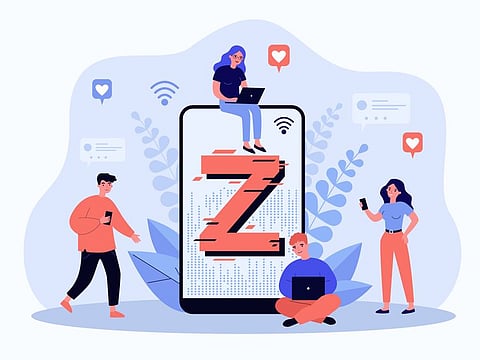Yeet! ‘Brat’ is Collins's Word of the Year. Can you keep up with Gen Z?
Collins lexicographers said 'brat summer' is now one of 2024's most talked-about words

Collins Dictionary has declared "brat" its 2024 Word of the Year. This playful term, popularised by Gen Z and Generation Alpha, has taken on a life of its own, reflecting the changing social landscape.
A Bratty take on the world
Initially associated with a spoiled or ill-mannered child, "brat" has evolved to signify a more complex and empowered attitude. It's a term that celebrates individuality, confidence, and a disregard for societal norms.
The term 'brat" gained prominence after the "Kamala IS Brat" viral moment. Originally a Charli XCX album title, it now embodies a 2024 spirit: a mix of hedonism, anxiety, self-acceptance, and rebellion. This word perfectly captures the year's complex energy.
Gen Z's lexicon: A new era of slang
Collins' Word of the Year choices are based on lexicographers' analysis of trending words on social media. This year's list includes "era," linked to Taylor Swift's Eras Tour and defined as "a period of distinctive character in one's life or career," and "yapping," meaning to talk excessively about irrelevant topics.
Other words that made the shortlist include "delulu," which means "wildly unrealistic or mistaken in expectations," and "looksmaxxing," a term from online male communities referring to improving one's appearance.
The trend of "rawdogging" travel—taking trips without entertainment—also featured, alongside serious entries such as "anti-tourism," relating to protests against tourism in Europe, and "supermajority," indicating a significant legislative majority.
Many of these terms were popularized by Gen Z and Generation Alpha, driven by platforms like TikTok and Snapchat. For example, "rawdogging" gained attention through TikTok clips of travelers enduring flights without entertainment.
Decoding Gen Z slang
Gen Z has its own unique language, often leaving older generations scratching their heads. Understanding their slang can help bridge the generational gap, especially in the workplace.
Why is understanding Gen Z Slang important?
Gen Z, the first generation to truly grow up with the internet, is tech-savvy, socially conscious, and has a unique way of communicating.
Gen Z has a knack for creating a language all their own. Their slang, filled with acronyms, emojis, and internet-specific terms, can often feel like a secret code to those outside their generation. This ever-evolving slang, influenced by social media and internet culture, can leave older generations feeling lost and excluded.
To avoid serious FOMO (fear of missing out), it's important to stay up-to-date on the latest Gen Z slang By understanding Gen Z's language, you can bridge the generational gap, connect with younger individuals, and navigate the digital world with confidence. In the workplace, learning their slang can help you foster a more inclusive environment and build stronger relationships with younger colleagues.
A quick guide to Gen Z slang
To better understand and communicate with the younger generation, it's essential to familiarize yourself with their unique language. Here's a quick guide to some common Gen Z slang terms:
Big Yikes: Extremely embarrassing or awkward.
Bop: A catchy song.
Boujee: Fancy or pretentious.
Cap: Not true or honest.
Clout: Influence or fame.
Drip: Fashionable style.
Extra: Over-the-top or excessive.
Fire: Amazing or impressive.
Ghost: To suddenly stop communicating with someone.
Gucci: Good or fine.
Highkey: Openly or obviously.
L: Loss.
Lit: Exciting or amazing.
Lowkey: Discreetly or subtly.
Periodt: Used to emphasie a point.
Receipts: Evidence or proof.
Salty: Upset or annoyed.
Shook: Deeply shocked or amazed.
Simp: Someone who is overly attentive.
Slay: To do something exceptionally well.
Stan: An obsessive fan.
Sus: Suspicious.
Tea: Gossip or juicy information.
Vibe: Overall mood or atmosphere.
W: Win.
Yeet: To throw something forcefully.
Yike: Embarrassing or awkward.
By understanding these terms, you can bridge the generational gap and improve communication, especially in the workplace.
(With inputs from Agencies and www.collinsdictionary.com)
Sign up for the Daily Briefing
Get the latest news and updates straight to your inbox



